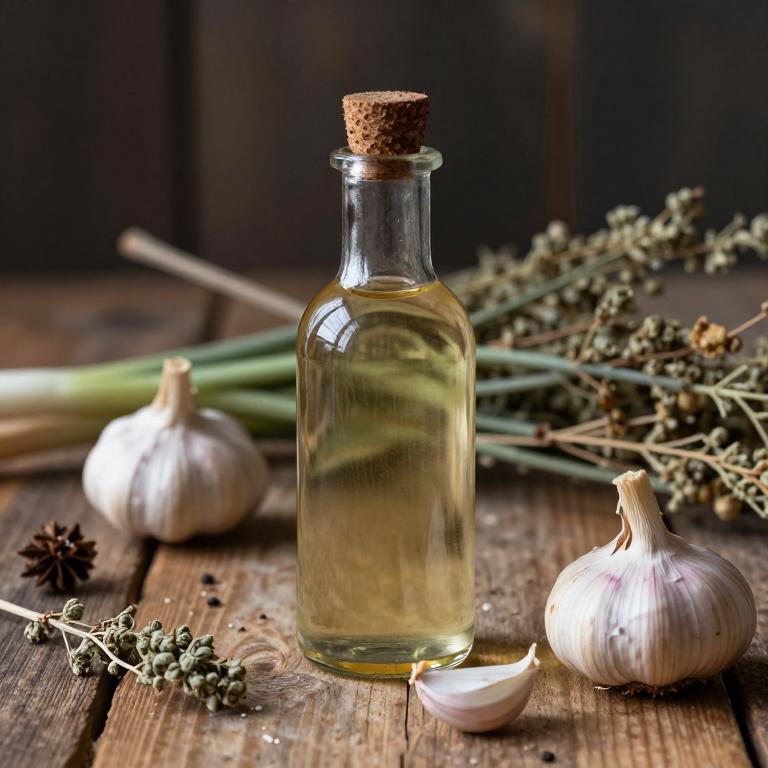10 Best Herbal Syrups For High Cholesterol

Herbal syrups have gained popularity as natural alternatives for managing high cholesterol, often containing ingredients like garlic, ginger, and psyllium husk, which are believed to support cardiovascular health.
These syrups work by potentially reducing LDL cholesterol levels and improving overall lipid profiles through their antioxidant and anti-inflammatory properties. While some studies suggest that certain herbs may have a modest effect on cholesterol, they are generally not a substitute for prescribed medications or lifestyle changes. It is important to consult a healthcare provider before using herbal syrups to ensure safety and effectiveness, especially for individuals with existing health conditions.
Overall, herbal syrups can be a complementary approach when used alongside a balanced diet and regular exercise.
Table of Contents
- 1. Common grape (Vitis vinifera)
- 2. Garlic (Allium sativum)
- 3. Turmeric (Curcuma longa)
- 4. Salvia (Salvia officinalis)
- 5. Ginger (Zingiber officinale)
- 6. Stinging nettle (Urtica dioica)
- 7. Thistle (Silybum marianum)
- 8. Ceylon cinnamon (Cinnamomum verum)
- 9. Dog rose (Rosa canina)
- 10. Blessed thistle (Cnicus benedictus)
1. Common grape (Vitis vinifera)

Vitis vinifera, commonly known as the grape vine, is the source of resveratrol, a polyphenolic compound that has been studied for its potential cardiovascular benefits.
Herbal syrups made from Vitis vinifera are often used as natural supplements to support heart health and manage high cholesterol levels. These syrups may help reduce low-density lipoprotein (LDL) cholesterol, often referred to as "bad" cholesterol, while promoting the production of high-density lipoprotein (HDL) cholesterol. The antioxidant properties of resveratrol are believed to play a key role in these effects by reducing oxidative stress and inflammation in the bloodstream.
However, it is important to consult with a healthcare professional before incorporating Vitis vinifera syrups into a cholesterol management plan, as they may interact with other medications or have varying efficacy depending on individual health conditions.
2. Garlic (Allium sativum)

Allium sativum, commonly known as garlic, has been traditionally used for its potential cardiovascular benefits, and garlic-based herbal syrups have gained attention for their role in managing high cholesterol.
These syrups typically contain aged garlic extract, which is believed to be more bioavailable and less pungent than raw garlic. Studies suggest that garlic may help lower low-density lipoprotein (LDL) cholesterol, often referred to as "bad" cholesterol, by inhibiting enzymes involved in cholesterol synthesis. However, the effectiveness of garlic syrup can vary depending on the formulation and dosage, and it is generally recommended to consult a healthcare provider before use.
While garlic syrups are considered safe for most people, they may interact with certain medications, particularly blood thinners, and should be used with caution.
3. Turmeric (Curcuma longa)

Curcuma longa, commonly known as turmeric, has been widely studied for its potential health benefits, particularly in the context of managing high cholesterol.
Herbal syrups made from curcuma longa often contain curcumin, the active compound responsible for many of its therapeutic properties. These syrups are believed to help reduce low-density lipoprotein (LDL) cholesterol, often referred to as "bad" cholesterol, while also supporting overall cardiovascular health. The anti-inflammatory and antioxidant properties of curcumin may contribute to improved lipid metabolism and reduced oxidative stress in the body.
However, while preliminary research shows promise, it is important to consult with a healthcare professional before using curcuma longa syrups as a supplement for cholesterol management.
4. Salvia (Salvia officinalis)

Salvia officinalis, commonly known as common sage, has been traditionally used for its various medicinal properties, and recent research suggests that its herbal syrup may offer benefits for managing high cholesterol.
The active compounds in sage, such as rosmarinic acid and flavonoids, are believed to support cardiovascular health by reducing low-density lipoprotein (LDL) cholesterol levels. Some studies indicate that sage syrup may help improve lipid profiles by inhibiting the absorption of dietary fats and promoting the excretion of excess cholesterol. While more clinical trials are needed to confirm its efficacy, many individuals use sage-based syrups as a natural complement to their cholesterol-lowering regimen.
As with any herbal supplement, it is important to consult with a healthcare provider before incorporating sage syrup into a treatment plan for high cholesterol.
5. Ginger (Zingiber officinale)

Zingiber officinale, commonly known as ginger, has been traditionally used for its medicinal properties, and recent studies suggest that ginger herbal syrups may offer benefits for individuals with high cholesterol.
The active compounds in ginger, such as gingerol and shogaol, are believed to help reduce low-density lipoprotein (LDL) cholesterol, often referred to as "bad" cholesterol, while potentially increasing high-density lipoprotein (HDL) cholesterol, known as "good" cholesterol. These syrups are typically made by extracting the bioactive components of fresh or dried ginger and combining them with sweeteners and herbal extracts to create a palatable formulation. While ginger syrup is not a substitute for prescribed cholesterol-lowering medications, it may serve as a complementary therapy when incorporated into a balanced diet and healthy lifestyle.
However, it is important to consult a healthcare professional before using ginger syrup, especially for individuals with existing health conditions or those taking other medications.
6. Stinging nettle (Urtica dioica)

Urtica dioica, commonly known as stinging nettle, has been explored for its potential health benefits, including its use in herbal syrups for managing high cholesterol.
These syrups are typically prepared by harvesting the fresh leaves and processing them into a concentrated liquid form, which can be taken orally. Some studies suggest that Urtica dioica may help reduce LDL cholesterol levels due to its high content of antioxidants and minerals like calcium and iron. However, more clinical research is needed to confirm its efficacy and safety for long-term cholesterol management.
As with any herbal remedy, it is advisable to consult a healthcare professional before incorporating Urtica dioica syrups into a cholesterol-lowering regimen.
7. Thistle (Silybum marianum)

Silybum marianum, also known as milk thistle, is a herbal remedy that has been studied for its potential benefits in supporting liver health and possibly aiding in the management of high cholesterol.
While it is not a substitute for prescribed cholesterol-lowering medications, some research suggests that silybum marianum may help improve lipid profiles by increasing HDL (good cholesterol) and reducing LDL (bad cholesterol) levels. Herbal syrups containing silybum marianum are often marketed as natural supplements to support cardiovascular health, though their efficacy can vary depending on formulation and individual response. It is important to consult with a healthcare provider before using these syrups, especially if you are on other medications or have underlying health conditions.
Overall, silybum marianum herbal syrups may offer some supportive benefits for cholesterol management, but they should be used as part of a comprehensive approach that includes diet, exercise, and medical advice.
8. Ceylon cinnamon (Cinnamomum verum)

Cinnamomum verum, commonly known as true cinnamon, has been traditionally used in herbal remedies for its potential cardiovascular benefits.
When prepared as a herbal syrup, it may help support healthy cholesterol levels by promoting the metabolism of lipids and reducing oxidative stress in the body. The active compounds in cinnamon, such as cinnamaldehyde and polyphenols, are believed to contribute to its cholesterol-lowering effects. However, while some studies suggest promising results, more research is needed to fully understand its efficacy and safety in managing high cholesterol.
It is often recommended to use cinnamon syrup in conjunction with a balanced diet and regular exercise for optimal heart health.
9. Dog rose (Rosa canina)

Rosa canina, also known as rosehip, is a traditional herbal remedy that has been used for centuries to support cardiovascular health.
Rosa canina herbal syrups are rich in bioactive compounds, including antioxidants, flavonoids, and essential fatty acids, which may help reduce cholesterol levels. These syrups are often recommended as a natural complement to a balanced diet and lifestyle for individuals managing high cholesterol. The anti-inflammatory and antioxidant properties of rosehip may contribute to improved lipid metabolism and reduced oxidative stress in the body.
While more research is needed, some studies suggest that regular consumption of Rosa canina syrup could be beneficial in supporting healthy cholesterol levels when used as part of an integrative approach to heart health.
10. Blessed thistle (Cnicus benedictus)

Cnicus benedictus, also known as blessed weed, is a traditional herbal remedy that has been used for its potential cardiovascular benefits.
Herbal syrups made from Cnicus benedictus are believed to support heart health by helping to lower cholesterol levels. The plant contains compounds that may aid in reducing low-density lipoprotein (LDL), often referred to as "bad" cholesterol. While some studies suggest its possible efficacy, more scientific research is needed to confirm its effectiveness and safety for long-term use.
As with any herbal supplement, it is important to consult a healthcare professional before incorporating Cnicus benedictus syrup into a cholesterol management plan.